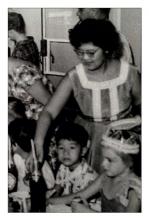((Although his family was denied entry to Hong Kong, Paul was born here in 1937, just before the great typhoon that hit Hong Kong that year.))
My brother Viacheslav was born in Shanghai in September, 1935, and I must have been conceived there sometime in December, 1936. It was a difficult time for my parents, Tonia and Ivan Atroshenko. The global economic depression of the 1930s had not affected Shanghai too badly but jobs were scarce for White Russians like my father. Social security did not exist for Stateless emigres like him.
To make matters worse, on August 13th, 1937, the Japanese military attacked the Chinese controlled sections of Shanghai causing widespread confusion and misery amongst the Chinese population. The Japanese expected a quick victory and had boasted that they would occupy Shanghai in just three days and that China itself would surrender to Japan in three months.
To everyone's surprise, the poorly equipped Chinese Nationalist army under Chiang Kai-shek put up a determined resistance and the battle for Shanghai lasted for three months. Although the Chinese eventually lost their sections of Shanghai, suffering some 200,000 casualties, the fact that they had held out for so long was a great morale booster for them. The Foreign Concessions within the city continued to be administered by various European Powers, such as the French and the British.
The Japanese never managed to conquer the whole of China, although they did inflict immense suffering upon the Chinese population in the years to come.
My father hated the Japanese. He had been a boy soldier in the Russo-Japanese war of 1905 and had witnessed atrocities committed by the Japanese army in that conflict. Not wishing to live under Japanese military control, he somehow managed to obtain passage for his family and himself on a tramp steamer to Hong Kong.
When the ship arrived in the British Crown Colony, my family was informed by the authorities that they could not remain there. They had to return to China and apply for proper visas to gain official entry to the Colony. They were advised to sail with the ship to Canton (now called Guangzhou).
Because of the Japanese military aggression which had spread south, thousands of Chinese were desperate to enter Hong Kong hoping to be protected by the British. Thanks to the huge influx of people, typhoid and cholera epidemics were raging throughout the colony and the British authorities were at their wits end trying to sort out the problems brought on by the flood of terrified refugees.
No sooner had my father been told that he and his family had to go back to China, my mother began to experience the pains of childbirth. I was about to make my entrance. She was rushed to the Matilda Hospital which is close to Victoria Peak. My father and brother remained on the tramp steamer in Hong Kong Harbour.
The Chinese believe that the number four is unlucky. On the fourth day of my existence, Hong Kong was hit by the worst typhoon in its history. In the harbour itself, normally protected from severe winds, about thirty ships dragged their anchors and were swept ashore. It was later estimated that eleven thousand people died in the colony during the storm. A tidal wave 18 foot high swept away the village of Tai Po in the New Territories. Hundreds of junks from the fishing village of Aberdeen were smashed to pieces by the huge seas and their crews perished without a trace.
Just before the typhoon hit Hong Kong with maximum force, the doctors and nurses at the Mathilda Hospital decided to unite all the babies with their mothers and leave them unattended in the maternity ward. They reasoned that it would be better for the mums and bubs to perish together. The medical staff then wisely went to the safety of the small typhoon shelter.
The typhoon was so severe that the Morants (a French family who befriended us during the Second World War) told us several years later that their garage door, which was made of solid iron and which sat on open hinges, was lifted from its position by the wind and tossed away like a paper plate. Their car, which had its parking brake on, was sucked out of the garage and flung down the slope.
The maternity ward in Mathilda Hospital was devastated by the powerful gusts of wind. All the windows were smashed and there was utter chaos in the ward. But when the doctors and nurses emerged from the typhoon shelter a day later they discovered that all the mothers and their tiny infants had miraculously survived. It was my first lucky break.

